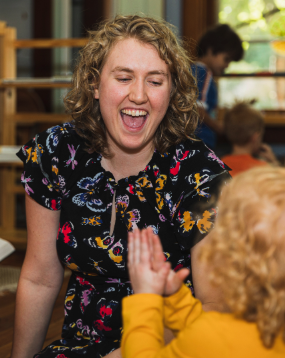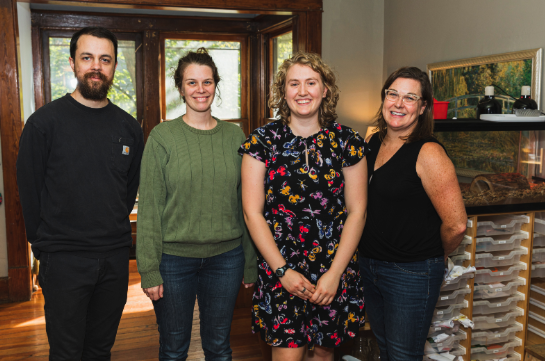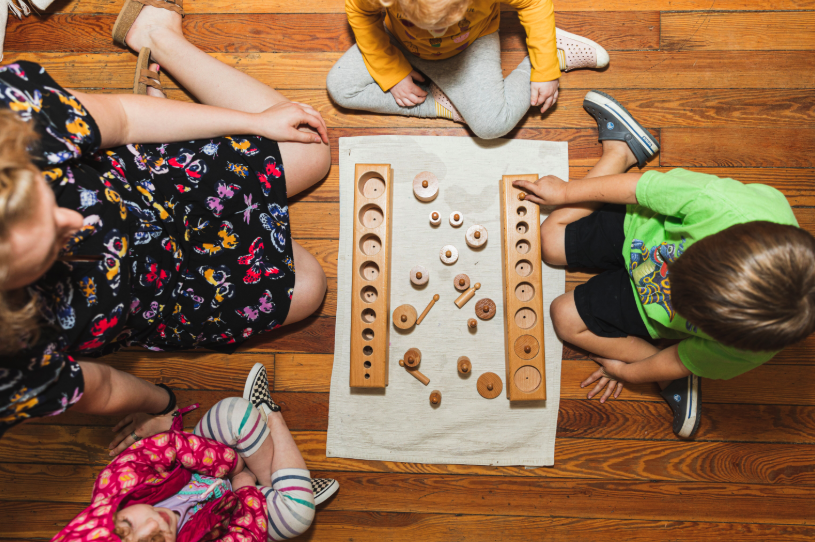Photographer / Michael Durr
 When the Village Montessori School opened in 2010, founders chose the name because the word “village” evokes the warm feeling of community and shared support.
When the Village Montessori School opened in 2010, founders chose the name because the word “village” evokes the warm feeling of community and shared support.
“It’s a pretty pivotal time as a parent when your child is in preschool and you’re in the trenches with everybody,” says Anne Schollenberger, the preschool’s director.
Emily Watson knows this firsthand.
“I had a second child, in part, because I felt so at home with Village Montessori [while my older son was enrolled there],” Watson says. “I knew that I could cope with more children if I had their support.”
The school nurtures independence in each child by encouraging children’s natural curiosity.
“Three-year-olds want to do everything themselves — push the button, zip the coat, tie the shoes — so we slow everything down so they can practice those skills,” says Maria Leeman, the school’s lead teacher.
Doing everything in the child’s time takes a lot of preparation, work and thought.
“You have to put your own biases aside and pay attention to what they need,” she says. “It’s a lot of observing, getting on their level and taking the time to understand them as an individual and as a group.”
Watson appreciates how dedicated the Village Montessori teachers are to practicing patience.
“They’re willing to teach and reteach processes like preparing a snack or arranging a model of a plant,” says Watson, whose 2-year-old son is thrilled with his new self-sufficiency and independence.
“I move to put cereal in his bowl and he stops me: ‘I do it!’ He brings his dishes to the sink and says, ‘I did it!’” Watson says. “Learning the small processes of school has made him attuned to the processes at home and he readily puts away socks in one drawer and picks out underwear from another without any prompting from me.”
It’s the Montessori way of providing dignity through mindful preparation for the child’s needs.
“We don’t disvalue children because they’re young,” Leeman says. “We give them the time to learn at their pace and if that means taking 10 minutes to put on a shoe, that’s what we give them.”
 These days, in particular, society is a slave to clocks, schedules and technology, all of which cause us to move at record speed. At Village Montessori School, however, they stop and smell the roses — literally. Being outside is vital to the curriculum for multiple reasons. Children naturally come to a sense of peace when they’re in nature.
These days, in particular, society is a slave to clocks, schedules and technology, all of which cause us to move at record speed. At Village Montessori School, however, they stop and smell the roses — literally. Being outside is vital to the curriculum for multiple reasons. Children naturally come to a sense of peace when they’re in nature.
The 24-member class makes a circle outside every day, inhaling the fresh air, relishing the sun on their cheeks, listening to chirping, squeaking, clucking animals around them and touching the bugs and the dirt. They also talk about their responsibility for taking care of the Earth.
“When we’re standing on the ground outside and talking about how to recycle, it makes it more real,” Leeman adds.
The school also has chickens that the students feed and water daily. It’s just another way for them to understand about caring for living things.
“It’s a key concept to drive home during a developmental phase when it’s typically all about me, me, me,” Schollenberger says. “To learn to have that empathy prepares them to be good people.”
Watson agrees.
“All our teachers provide the support and modeling our children need to become self-directed, self-disciplined, self-possessed learners who care about and for their little school community,” she says.
The students also enjoy recess on the playscape.
“Rather than a jungle gym, which serves only one purpose, the playscape has things they play with that can evolve into multiple facets of learning,” Leeman says. For instance, a sandbox allows kids to dig trenches, build castles and make “cakes.” They also have an agility course, a climbing tube and a tire they can climb over or hide under. Plus, they’ll soon be adding a mud kitchen, complete with dirt, sand and leaves. Providing all of these options gives students a chance to work their small and large motor skills.
“It’s not so much about having it all as much as it is giving them what they need when the need arises,” Schollenberger says.
 For instance, when the kids are fighting and need to let off steam, teachers bring out the bubbles, which calms everyone down.
For instance, when the kids are fighting and need to let off steam, teachers bring out the bubbles, which calms everyone down.
And while the students are allowed to make messes, they also clean up themselves.
“We don’t just swoop in and do it for them,” Leeman says. “That’s part of the independence and dignity.”
Speaking of independence, curriculum is guided by student choice.
“People who are forced to do things learn nothing but anger,” Leeman says.
In the absence of mandate, however, the neurons start firing.
“I eavesdrop on four-year-olds negotiating the most equitable way to divide banana slices,” Watson says. “They use specialized learning tools and demonstrate how quantities are squared and cubed. I can only imagine how much better a math student I would have been if I had learned sophisticated concepts through play as a child rather than struggling with abstract ideas as a teenager.”
Leeman loves teaching preschoolers because it’s setting the stage for who they will become.
“How we want the world to be really starts with these 3 to 6-year-olds,” Leeman says. “This is where they are taught to be good people.”
Village Montessori is located at 6535 Ferguson Street in Indianapolis. For more information, call 317-257-7447 or visit them online at indyvillagemontessori.com.






